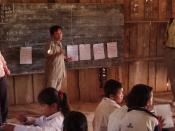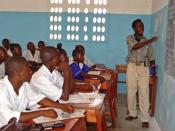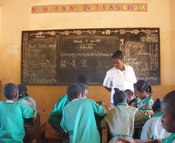Comedy often challenges the norm- and both Hector and Irwin offer alternative approaches to education. How serious do you think is the plays critique of education?
As the basis for the plays narrative, the education system plays a prominent role throughout the play, with each character presenting their own distinguished view of education.
In particular Bennett presents 3 different teaching styles through the characters of Hector, Irwin and Mrs. Lintott, with each character projecting their own distinguished view on the education system and how their subjects should be approached. While Mrs. Lintott prefers functionalism, Hector prefers enrichment and believes that education is something to carry you through life and not simply exams. Irwin in particular teaches with equal balance between functionalism and enrichment, presenting his own individual view on education.
Hector, notably a man of "studied eccentricity" expresses a very abstract, inharmonious opinion on education and its purpose, believing that education- particularly literature- is for life and not solely for entrance exams.
Hector teaches General Studies, something he openly detests from the opening of the book calling it "useless knowledge" and "a waste of time" and becomes agitated when the boys continually ask "will this be in the exam?". In Hectors opinion, exams and factual repetition are not the embodiment of knowledge, "forget Oxford and Cambridge" and has a dedication and love for knowledge which he conveys to his students, referring to the Houseman quote "all knowledge is precious whether or not it serves the slightest human use" which could be seen as to encapsulate not only the philosophy of Hector's teaching, but possibly his attitude to life generally, and expresses how highly he values any sort of knowledge which contributes to the creation of a liberated cultured human being.
He tells Timms (when talking about...


